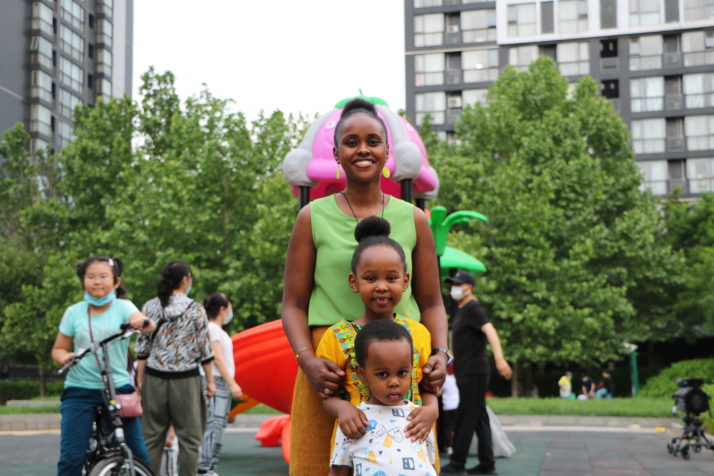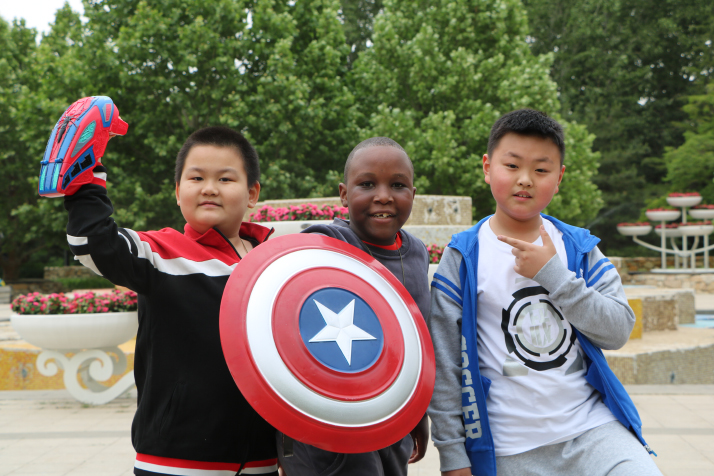|
||||||||||
| Home Nation World Business Opinion Lifestyle ChinAfrica Multimedia Columnists Documents Special Reports |
|
||||||||||
| Home Nation World Business Opinion Lifestyle ChinAfrica Multimedia Columnists Documents Special Reports |
| ChinAfrica |
| Stories of African children growing up in China |
| With the deepening of cross-cultural bonding, more and more African people have come to China for a new work and life experience |
| By Li Xiaoyu VOL.12 July ·2020-07-20 |

With the deepening of cross-cultural bonding, more and more African people have come to China for a new work and life experience. Some of them choose to bring their children with them. Elema Wario and Bridget Mutambirwa are among them. Despite some challenges, both of them think it is a good thing to have their kids study in a foreign country like China at a young age.
"This cultural blending is helping them grow into global citizens, which will serve them well into and past adulthood both in their personal and work lives," said Elema.
Valuable experience
Elema is from Kenya and her husband comes from Rwanda. Their son and daughter both were born in Beijing, where she works as a teacher in an international school. As part of the employment package, her children are enrolled by her school, which is open to foreign passport holders only.
At her school, Western and Chinese teachers together plan and teach lessons about Chinese culture, music, arts and sports, among others. She feels that the multi-cultural mix of students and teachers gives her children a sense of well-being and confidence in communicating with anyone from any culture.
"I believe the total immersion in a foreign language is extremely important [for my kids] as it helps them develop the skills they need to become proficient speakers without even thinking about it," she said.
Like Elema, Bridget, who is from Zimbabwe, works in Beijing as an editorial consultant with a Chinese media group. Her 9-year-old son Michael Hwasheni began his education in China at the age of 4. Before that, he had attended kindergarten in Zimbabwe.
Michael currently studies in a semi-international school called Beijing Zhongshan Experimental Primary School. "I chose a semi-international school so that he could have a bit of both of Western and Chinese education and experience," Bridget told ChinAfrica.
For her, to study in China is not just about the experience; it has other advantages. "Attending the school here certainly gives a lot more exposure and experience and it's much more modern compared to my country. The curriculum is well connected to reality and prepares him for an advanced society," she explained.
Language issue
Like most of the international students, language barrier was one of the biggest challenges for Michael in his early days in China. "He had no choice but to learn Chinese because he was the only foreigner at his kindergarten," recalled his mother.
His way to overcome this obstacle was to watch Chinese cartoons, like Boonie Bears. Out of that he developed a liking for the cartoon characters and an interest to know what they were saying. Besides, "he has never really had any other foreign friends to play with except Chinese, so this also helped him gain confidence in a foreign country and learn the Chinese culture and norms faster," Bridget said.
His proficiency in Chinese language and interest in acting helped him succeed in performing twice on the children's channel of China's Central Television. This made him even more confident in his Chinese studies.
Being born in China, Elema's son and daughter didn't have too much difficulty in studying the local language. At their current school, both Chinese and English are given equal importance; at home, their father, who is fluent in Chinese, supports them with their Chinese homework, while their mother assists with English. Due to their Chinese language proficiency, they can fit in quickly and have friends who are culturally different.

Coping with lockdown
To their relief, the two mothers didn't see their children's studies being interrupted by the ongoing epidemic. In that way, online classes helped a great deal, they noted.
"Life almost went on as normal for my son, because the teachers are doing their best to use more apps to enhance the learning," said Bridget. "I appreciate that." Michael actually does like online classes and pays a lot of attention to them. That is something his mother is content with. "Somehow it's all working out," she said with smile.
Bridget has also become more involved in Michael's school work by participating in some of his online activities such as sport, art, music and science classes. "I'm like his teacher at home who supervises what he learns online," she said. In addition, she has managed to create a school environment out of her home by, for example, allowing him to decorate his working area in the way he wants.
For Elema's children, online learning was something new, so they did complain of fatigue and disconnection from classmates and teachers. To help them adapt to the new learning mode, Elema made the decision to reduce their screen time by putting the TV in storage, so that they could play more with their toys and each other after online lessons and didn't have to add to their screen time for entertainment. As no new content has been taught during this period, she and her husband tried to fill in the gap in skills and content through what is essentially homeschooling. But she confessed it was "not an easy task!"
Future plans
Talking about the future plans for her kids, Elema said that whether they continue to stay abroad or not, she would like them to continue their exposure to Chinese language as well as multiple cultures. However, she thinks that it would be great to have a part of their education in their younger years back home to ground them in their own culture and avoid the problems and challenges that kids living in foreign countries easily experience around identity, long-term friendships and the question of "where is home."
"It's important that parents make sure that the children are connected with their home country," said Elema. For that, she has tried to visit their extended families once or twice a year for several weeks at a time, speaking their mother tongues at home as well as making social connections with their compatriots in Beijing.
For her part, Bridget seems ready to face what lies before them. "The other day I was surprised when he showed me photographs of Tsinghua University and told me he wanted to study there when he grows up," she revealed. "I am going to keep supporting his studies in whatever way he needs. Lockdown or no lockdown, life goes on!"
(Printed Edition Title: Cultivating Global Citizens)
Comments to lixiaoyu@chinafrica.cn
| About Us | Contact Us | Advertise with Us | Subscribe |
| Copyright Beijing Review All rights reserved 京ICP备08005356号-5 京公网安备110102005860号 |